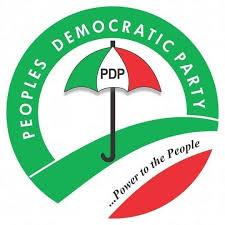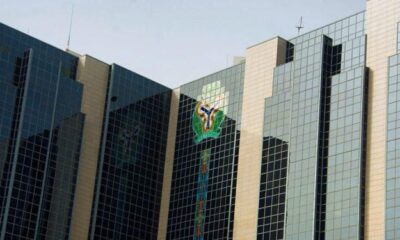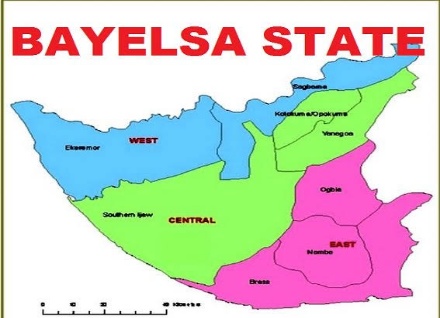Business
Unclaimed Dividend Grows By 7.35% To N190bn, Says SEC
Published
9 months agoon
By
Editor
The total value of unclaimed dividends has risen to N190bn, representing a 7.35 per cent rise from N177bn recorded in 2021, which was the last figure from the Securities and Exchange Commission.
This was revealed on Friday at the media briefing, following the quarterly Capital Market Committee meeting in Abuja.
The SEC’s Executive Commissioner, Operations, Dayo Obisan, stated that while the figure for the unclaimed dividend had gone up, there was a need to pay attention to the pace of increase.
Obisan said, “It is estimated to be N190bn, but I think one of the most important questions to keep asking is the trajectory of growth. Is it growing at a reduced pace? One of the major issues that keeps the figure of unclaimed dividends high is having the final beneficiaries of this money have access to them.”
READ ALSO: Your Policies Will Destroy Nigeria If Not Revised – Gumi Warns Tinubu
He added that efforts were being made to reduce the figure.
“At our meeting yesterday (Thursday), we discussed that efforts are being made by the regulators and other capital market operators to ensure that the spate and volume of unclaimed dividends is reduced by transmitting them to the beneficial owners.
“We keep putting a lot of efforts and activities towards making sure that investors on their own come forward to claim their dividends, update their information and other Know Your Customers details, which will not only help us reduce the volume of unclaimed dividend but ensure that future benefits, which is not only limited to unclaimed dividends, get quickly transmitted.
“Thirdly, that everyone in the capital market is rightly and adequately accounted for, so that our data is more robust to aid our planning.”
READ ALSO: Profiles Of The Deceased Military Personnel In Niger Crash
Last year, the SEC declared that the total value of unclaimed dividends in the country rose to N177bn in 2021 from N168bn in the prior year. The figure was N158.44bn in 2019.
The value of unclaimed soared by a whopping 8,369 per cent from N2.09bn in 1999 to N177bn in 2021 and went up by 96.67 per cent from N90bn in 2015, when the e-dividend mandate was introduced by SEC.
Meanwhile, the SEC Director-General, Lamido Yuguda, revealed that registered exchanges in Nigeria outperformed global indices in the first half of the year.
Yuguda said, “The registered exchanges present at the meeting informed members that Nigeria outperformed global indices on gains in the All-Share Index and market capitalisation.
“This exceptional performance can be attributed to several factors such as appealing dividend yields offered by certain stocks, the recovery of corporate earnings and a notable improvement in sentiments among domestic retail investors. Also, all indicators reflecting investor involvement including volume, value and the number of transactions have demonstrated month-on-month increase throughout the first half of 2023.”
READ ALSO: JUST IN: Niger Junta Gives French Ambassador 48 Hours To Leave – Report
Also, the SEC DG allayed fears about the proposal of the Nigerian Exchange Limited to allow the listing of dollar-denominated bonds by some selected companies and later equities.
He said, “For dollar-denominated bonds listed on the NGX, I don’t see any problem. Any bond should be an obligation. It is backed by the ability of the obligor to repay the bonds. So, while that bond has that attribute, then it doesn’t matter the currency or the denomination.
“Of course, that bond could be a corporate bond, a sovereign bond or an agency bond. What matters really is person or entity that has borrowed the money through that bond is able to meet the requirement of both interest and principal as they fall due. Once, it is there, it is a good investment for those who wish to participate in those kinds of funds.”
PUNCH
You may like
Business
CAC Opens Centre For Registration Of PoS Operators
Published
4 days agoon
May 9, 2024By
Editor
The Corporate Affairs Commission has inaugurated a centre for bulk registration of Point of Sale operators in its database.
The CAC Registrar-General, Hussaini Magaji, said this while inaugurating the centre stationed at its Federal Capital Territory Office in Abuja on Wednesday.
According to Magaji, the importance of registering the PoS operators in the commission’s database cannot be over emphasised.
He said the centre was well equipped with all the necessary facilities to operate 24 hours a day and ensure the commission’s achievement of its purpose.
READ ALSO: ICYMI: FG To Delist Naira From P2P Platforms
“What we did was accommodate the request from the Fintechs.
“We have allowed them to integrate with the Corporate Affairs Commission; they have developed their structure, and we gave them access.
“Once they supply the necessary details for registration on their platform, the certificate is generally generated and transmitted directly to their platform without them having to contact anyone.
“We have done this to ensure that everyone gets it easy without hitches, but if they choose to apply manually, we have a secretariat open for them to do so,” he stated.
READ ALSO: ICYMI: FG Gives Deadline To PoS Operators To Register With CAC
Recall that the Federal Government through the CAC on Tuesday issued a two-month registration deadline to Point of Sales companies, to register their agents, merchants, and individuals with the commission in line with legal requirements and the directives of the Central Bank of Nigeria.
Meanwhile, at the event, the registrar-general reiterated that the centre would be opened to all operators in the fintech industry who voluntarily submitted their agents and merchants for regularisation with the CAC.
Magaji said that the registration was in line with President Bola Tinubu’s desire to ensure financial inclusion for the youth and strengthen the fight against fraud, finance and other crimes in the country.
He further expressed his resolve to ensure compliance with the provisions of Section 863 (1) of the Companies and Allied Matters, CAMA 2020, and the CBN guidelines for Agent Banking, 2013.
READ ALSO: ICYMI: Five Things To Know About The New Cybersecurity Levy To Be Paid By Nigerians
On security, the CAC boss said that if a crime were committed using the PoS, the government would easily trace the perpetrators to the CAC data platform if such machines were registered.
“If an incident happens and they report it to CAC, if we do not have the operator’s details, we cannot respond, and that is the essence of this registration.
“The registration ensures that every detail of the person is provided, including NIN, passport photograph and all other useful documents.
“And it is an opportunity for more people to be captured into the formal sector,” he said.
The News Agency of Nigeria reports that the Special Adviser to the President on ICT Development and Innovation, Tokoni Peter attended the event.
The event was attended by Dr Salihu Dasuki, the Special Adviser to the President on ICT Policy Office, the PoS operators, and other stakeholders.
(NAN)
Business
FULL LIST: CBN Publishes List Of Licensed Deposit Money Banks
Published
4 days agoon
May 8, 2024By
Editor
The Central Bank of Nigeria has released a comprehensive list of licensed Deposit Money Banks operating within the country.
The list, which was made public on the CBN’s official website on Tuesday, provides insights into the banking landscape in Nigeria.
Banks with international authorisation include Access Bank Limited, Fidelity Bank Plc, First City Monument Bank Limited, First Bank Nigeria Limited, Guaranty Trust Bank Limited, United Bank of Africa Plc, and Zenith Bank Plc.
READ ALSO: BDC Operators Arrested As Naira Sells 1,416/$
Commercial banks with national authorisation include Citibank Nigeria Limited, Ecobank Nigeria Limited, Heritage Bank Plc, Globus Bank Limited, Keystone Bank Limited, Polaris Bank Limited, Stanbic IBTC Bank Limited, Standard Chartered Bank Limited, Sterling Bank Limited, Titan Trust Bank Limited, Union Bank of Nigeria Plc, Unity Bank Plc, Wema Bank Plc, Premium Trust Bank Limited and Optimus Bank Limited.
Commercial banks with regional licenses are Providus Bank Limited, Parallex Bank Limited, Suntrust Bank Nigeria Limited, and Signature Bank Limited.
Players in the non-interest banking sector with national authorisation include Jaiz Bank Plc, Taj Bank Limited, Lotus Bank Limited, and Alternative Bank Limited.
READ ALSO: [ICYMI]FULL LIST: 16 Banking Transactions Exempted From CBN’s New
In the merchant banking category, the apex banks listed, are Coronation Merchant Bank Limited, FBN Merchant Bank Limited, FSDH Merchant Bank Limited, Greenwich Merchant Bank Limited, Nova Merchant Bank Limited, and Rand Merchant Bank Limited.
The financial holding companies listed were Access Holdings Plc, FBN Holdings Plc, FCMB Group Plc, FSDH Holding Company Limited, Guaranty Trust Holding Company Plc, Stanbic IBTC Holdings Plc, and Sterling Financial Holdings Limited.
The Mauritius Commercial Bank Representative Office (Nigeria) Limited was listed as the sole representative office.
Business
[ICYMI]FULL LIST: 16 Banking Transactions Exempted From CBN’s New
Published
6 days agoon
May 7, 2024By
Editor
The Central Bank of Nigeria on Monday directed all banks to commence charging a 0.5 per cent cybersecurity levy on all electronic transactions within the country.
The apex bank stated this in a circular signed by the Director, Payments System Management Department, Chibuzo Efobi; and the Director, Financial Policy and Regulation Department, Haruna Mustafa; a copy of which was obtained by The PUNCH.
The circular, which was directed to all commercial, merchant, non-interest, and payment service banks, among others; noted that the implementation of the levy would start two weeks from Monday, May 6, 2024.
READ ALSO: Five Things To Know About The New Cybersecurity Levy To Be Paid By Nigerians
“The levy shall be applied at the point of electronic transfer origination, then deducted and remitted by the financial institution. The deducted amount shall be reflected in the customer’s account with the narration, ‘Cybersecurity Levy,’” the circular partly read.
In this piece, The PUNCH highlights all the 16 banking transactions that are exempted from the CBN’s new cybersecurity levy:
Loan disbursements and repayments
Salary payments
Intra-account transfers within the same bank or between different banks for the same customer
Intra-bank transfers between customers of the same bank
Other Financial Institutions instructions to their correspondent banks
Interbank placements,
Banks’ transfers to CBN and vice-versa
Inter-branch transfers within a bank
Cheque clearing and settlements
Letters of Credits
READ ALSO: FG To Delist Naira From P2P Platforms
Banks’ recapitalisation-related funding – only bulk funds movement from collection accounts
Savings and deposits, including transactions involving long-term investments such as Treasury Bills, Bonds, and Commercial Papers.
Government Social Welfare Programmes transactions e.g. Pension payments
Non-profit and charitable transactions, including donations to registered non-profit organisations or charities
Educational institutions’ transactions, including tuition payments and other transactions involving schools, universities, or other educational institutions
Transactions involving bank’s internal accounts such as suspense accounts, clearing accounts, profit and loss accounts, inter-branch accounts, reserve accounts, nostro and vostro accounts, and escrow accounts.

Tobi Amusan Becomes World’s Fastest Woman With New Track Record

Invictus Games: Prince Harry, Meghan Arrive In Lagos

JUST-IN: 34 Dead, 16 Missing In Indonesia Floods
Trending

 Headline5 days ago
Headline5 days agoMother Throws Disabled 6-year-old Son Into Crocodile Infested River [PHOTOS]

 News5 days ago
News5 days ago‘I’m Considering Having 4th Child’ – Mother Of Three Who Breastfeeds Husband , 3 Kids [PHOTOS]

 Headline5 days ago
Headline5 days ago‘Shame On You’- Ugandan Senator Knocked For Showing Off Wooden Bridge He Constructed

 News4 days ago
News4 days agoThe New Masquerade’ Actress, Ovularia Is Dead

 Politics5 days ago
Politics5 days agoEdo Poll: PDP Gubernatorial Aspirant Resigns From Party

 News4 days ago
News4 days agoBREAKING: Rivers State House Of Assembly Gets New Speaker

 Business4 days ago
Business4 days agoFULL LIST: CBN Publishes List Of Licensed Deposit Money Banks

 Metro4 days ago
Metro4 days agoEdo: Police Patrol Van Pursuing ‘Yahoo Boys’ Rams Into Motorcycle Convening Passenger

 News4 days ago
News4 days agoFather Of 12 Found Dead Inside Brothel In Bayelsa

 News3 days ago
News3 days agoVIDEO: Nigerian Man Exhumed After Completing 24-hour Buried Alive Challenge























